
II Scientific and Practical Conference “Green Construction” will bring together leading experts and business representatives in the field of environmentally friendly construction
On April 13-14, 2023, the II Scientific and Practical Conference “Green Construction” will be held.

The event will bring together representatives of government agencies, education and science, NGOs, business, top managers, leading experts, journalists and stakeholders in the field of energy-efficient and environmentally friendly green construction.
The event will be held in a mixed mode, participation is free of charge.
Conference materials along with the application form (attachment) should be sent by e-mail to kaflab241ecolog@gmail.com.
The Organizing Committee reserves the right to refuse to publish materials that do not meet the requirements for formatting or are of an abstract nature, as well as to make minor edits to the received materials. Authors receive an electronic version of the conference materials.
Partners:
Kyiv Regional Council; Subcommittee on Urban Development, Improvement and Land Relations within the Development Area of the Committee of the Verkhovna Rada of Ukraine on Organization of State Power, Local Self-Government, Regional Development and Urban Planning; State Enterprise “Research, Design and Technological Institute of Municipal Economy”; Odesa State Environmental University; Lviv Polytechnic National University; Taras Shevchenko National University of Kyiv; National University “Yuri Kondratyuk Poltava Polytechnic”; Yuriy Potebnya Engineering Education and Research Institute of Zaporizhzhia National University; Donbas National Academy of Civil Engineering and Architecture (Kramatorsk); Academy of Construction of Ukraine; Academy of Technical Sciences of Ukraine; Art Studio 22 ART HUB; National Union of Journalists of Ukraine;
International Technology Transfer Association (ITTA); The Agency for the Reconstruction of Ukraine; Czestochowa University of Technology; Azerbaijan University of Architecture and Construction; Georgian Technical University; Experts Club.
The time limit for a presentation is 7-10 minutes.
Contact phone numbers of the conference organizing committee:
Olena Zhukova +38(096)8752104, +38(063)8136063;
Tkachenko Tatiana Mykolaivna +38(067)353-38-77, +38(066)529-91-36
Open4business is a media partner
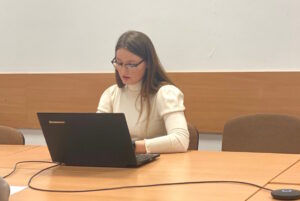
In March, the University of Łódź hosted an international scientific conference “Between the Reality of War and the Rhetoric of Peace”. The event was held under the patronage of the Voivode of Lodz and the Rector of the University of Lodz. This conference is a part of the Polish-Ukrainian art project aimed at popularizing the works of war artists, holding exhibitions of their works abroad, and publishing books about them as a way of their adaptation in peaceful life after the victory and overcoming the consequences of PTSD.
Aneta Pavlovska, Deputy Dean of the Faculty of Philosophy and History of the University of Lodz, Doctor of Science, Professor, who chaired the conference, emphasized the relevance of the project and spoke about the first such experience, the organization of 7 exhibitions of photographs by Captain Serhiy Belinsky, a press officer of the 28th separate mechanized brigade named after the Knights of the Winter Campaign, a famous musician and art photographer. Two catalogs of his works were published, scientific articles were written, and a monograph on Serhiy’s work in peacetime and wartime is currently being published at the Institute of Art History of the University of Lodz.

The following report was made by Yulia Ivashko, Doctor of Architecture, Professor at the Kyiv National University of Construction and Architecture, and press officer Serhiy Belinsky by phone from the Bakhmut direction.
The reports by Anastasia Urakina, a graduate student at the Kyiv National University of Construction and Architecture, and Agnieszka Gralinskey-Toborek, a doctoral student and professor at the University of Lodz, were directly related to the events of the war in Ukraine.
Anastasia Urakina presented a program of psychological rehabilitation and art therapy for people affected by the war, developed jointly with the Kyiv think tank “Experts Club“. The program primarily involves group work, which will be led by professional psychologists. Classes will be held at the “Experts Club“.
Anastasia Urakina’s theses on art therapy methods were a continuation of Ms. Agnieszka Gralinskay-Toborek’s discussion on which works of war survivors can be exhibited without harming the person, and which are only part of PTSD treatment.
It is worth noting that for the first time, Polish scholars had the opportunity to ask a Ukrainian artist at war questions live. Aneta Pavlovska asked how it is possible to remain an artist in the face of danger even in war. Serhiy answered that he has been in the army since 2021, he is used to it, his camera is always with him, and it is no less important for him than an information war with the enemy.
Yulia Ivashko showed a presentation of Serhii’s photographs and spoke about future plans to expand the circle of artists at war. The same point was emphasized by the Director of the Institute of Art History, Doctor of Science, Professor Piotr Gryglewski.
There were 18 presentations aimed at highlighting the work of military artists who experienced their own experiences, and the topic of war in art was also covered. Lukasz Sadowski, PhD, from the W. Strzemiński Academy of Arts in Lodz, highlighted the evolution of propaganda in Russian military painting.

Justyna Kobylarczyk and Dominika Kusznierz-Krupa, PhDs, professors at the T. Klczyuszko University of Technology in Krakow, who organized an exhibition Old-New Town at their university, showing Ukrainian cities before and during the war, said that such projects are needed.
Andriy Dmytrenko, PhD in Engineering, Associate Professor of National University “Yuri Kondratyuk Poltava Polytechnic”, highlighted the evolution of artistic messages during the war in Ukraine.
The conference ended with the presentation of the book “And the Light in the Darkness Shines” by Serhiy Belinsky and Yulia Ivashko about the war in Ukraine, published by the Krakow-based Impuls Publishing House.
ANASTASIA_URAKINA, ART, ART THERAPY, CLUB_OF_EXPERTS, CONFERENCE, KNUBA, LODZ_UNIVERSITY, PTSD, SERHIY_BELINSKY, YULIA_IVASHKO, АНЕТА_ПАВЛОВСЬКА
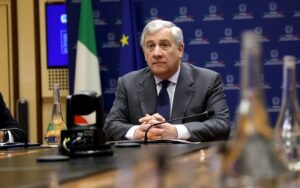
The Italian government plans to hold a conference on April 26 with the participation of Italian companies on the reconstruction of Ukraine, Italian Foreign Minister Antonio Tajani said.
“Today, together with the G7 foreign ministers, I announced that the government will organize a conference for the resumption of Ukraine on April 26 with the participation of Italian companies. Our commitment to peace and freedom for the Ukrainian people continues,” Tajani wrote on Twitter on Saturday.
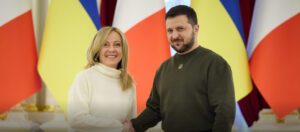
Italy will organize a conference involving its own business companies on Ukraine’s reconstruction in April this year, Italian Prime Minister Giorgi Meloni said.
“We talked today about the post-war reconstruction of Ukraine and about the Fast Recovery Plan, that is, the reconstruction now … In Italy a conference will be organized about the reconstruction in April of this year. We will work on its organization. Italian companies have the know-how and the competence to provide, because Italy wants to play a significant role in the reconstruction of Ukraine – starting now,” Meloni said at a press conference with the President of Ukraine in Kyiv.
She stressed that Italy can do a lot in this context because it has tremendous experience in many strategic areas like infrastructure, transportation, energy, agriculture, food, etc.
“Our know-how will be able to give an opportunity and the right signal: what was destroyed will be restored,” said the Italian prime minister.
In addition, she said, holding the international exhibition Expo 2030 in Odessa, where Ukraine has applied, would be a special signal to Europe, namely: “Belief that everything will be fine in Ukraine.”
Also, as Meloni noted, Italy already provides support and assistance to Ukraine in the field of protection of cultural heritage.
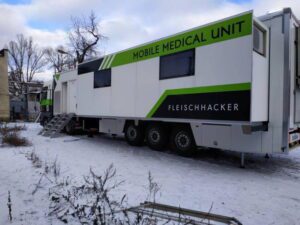
Together with partners, the Charitable Fund for Reconstruction and Development of Ukraine is planning to supply 52 full-fledged mobile hospitals equipped for surgeries and laboratory diagnostics in the immediate vicinity of active hostilities to the country.

As Artem Honcharenko, President of the Fund, said during a press conference at Interfax-Ukraine on Tuesday, the first hospital has already been committed to the Ministry of Defense and provides medical assistance to the military and civilian population in the area of active hostilities.
“The first hospital helps where there are active hostilities and heavy losses are possible. It is still the only one on the entire front line and is already saving lives. It is 52 hospitals that will help provide quick assistance along the entire front line in those places where quick assistance is needed,” he said.
Honcharenko specified that the number of hospitals was determined after consultations with military experts, including NATO ones. However, hospitals may have different specifications.
“The price at which such a hospital is offered on the market is $360,000, but in negotiations with manufacturers, we came up with a price of EUR 232,000 plus additional transportation costs,” Honcharenko specified.
At the same time, he added that by now an advance payment of $40,000 had been made – “under my personal word of honor,” and the hospital had been brought to Ukraine, but fundraising continues. Currently, the flow of patients served by it is 100-150 people a day – both military and civilian, who are in gray zones and places of de-occupation. Medical care in the hospital is provided by military doctors, who have already been joined by civilians.
“The hospital can operate in 300 km of the border zone, where the aggressor’s missiles reach. This is a full-fledged hospital on wheels,” Honcharenko said.
He noted that the hospital can be deployed and start working within 15 minutes, it is completely autonomous, equipped with a generator and has the ability to connect to external power. The Fund is currently exploring the possibilities of assembling hospitals in Ukraine.
The second hospital, according to the head of the charitable organization, the Fund plans to transfer to the clinic and medical center of the western region – “this is the so-called Lviv hospital.”
“We have signed a memorandum with them. We planned to transfer the first hospital to them, but we were asked to transfer it for special operations, so the first hospital operates where active hostilities are taking place,” Honcharenko specified.
According to Ukraine’s Armed Forces soldier Danyil Honcharenko, who has three wounds, due to the change in the operational situation at the front, the need for mobile hospitals capable of providing full-fledged medical care directly on the front line has increased significantly.
At the same time, another participant in the press conference, lawyer and serviceman Serhiy Petkov, noted their importance not only during active hostilities – after the victory they can continue to work in the aftermath of man-made disasters, accidents and terrorist attacks.

“If such a mobile hospital were in Dnipro on January 14, then more people could be saved before they were sent to hospitals, providing them with timely assistance on the spot,” he stressed.
Olena Kreknina, representative of the Dnipro Reconstruction and Development Foundation, spoke about cooperation with entrepreneurs.
“Raising funds for mobile hospitals is the most important area for us. We are engaging the business community, including the window business in Dnipro and companies such as AXOR, which has already joined. I urge all business representatives to join in saving lives, those who bring our victory closer,” she said.
According to the information announced during the press conference, the partners of the mobile hospitals project were the PR-agency Be my media, the Club of Experts, the Association of Science and Education of Ukraine, the National Guard of Ukraine, the Main Intelligence Agency of the Ministry of Defense of Ukraine, NGO Culture and Heritage of Ukraine, the International Technology Transfer Association (ITTA), the National University of Construction, the Physical culture and sports society Dynamo Ukraine, the licensed online school Focus, PATprofi – IT, Donbasenergo, the Amor Ukraine Health Organization, and NGO Ukrainian Diabetic Federation.
ARTEM_HONCHARENKO, CONFERENCE, EXPERTS_CLUB, FUND_FOR_RECONSTRUCTION_AND_DEVELOPMENT_OF_UKRAINE, HOSPITAL, MOBILE
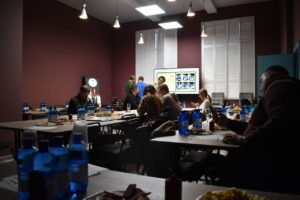
During the last two months a series of scientific and practical seminars-tastings of vintage drinks of 20-80 years old were held on the basis of Analytical center “Club of experts” with the assistance of a public association “Ukrsadvindindprom” and Charity fund “Reconstruction and development of Ukraine”. Representatives of Ukrainian wine industry, retail, mass media and other experts took part in these seminars.
All in all, participants of the workshops got acquainted with more than 40 kinds of vintage alcohol, produced in Ukraine and European countries in the second half of the last century. The total age of the drinks exceeds 3000 years.

In particular, such famous Ukrainian collection brands, as “Massandra sherry” from the 1980s and “Black Doctor” from 2007 were presented at the conferences. Among the European alcoholic brands the participants distinguished a rare sherry brandy “Hispano” 1870 (!), another Spanish drink “Ponche Rives” 1978, vermouth “Marsala” 1950-ies and other drinks. All in all 15 different vintage drinks were evaluated by the participants.
According to the words of the expert-collector of vintage alcoholic drinks Igor Magalas, the cost of the majority of samples which were presented at the seminars does not exceed the prices of similar drinks on supermarket shelves. At the same time, the taste and eco-friendliness of vintage drinks are an order of magnitude superior to many modern brands.
“The thing is that the automation of alcohol production lines, which became widespread at the end of the last century, led to a natural decline in quality for the sake of quantity. More than once I faced situations when at closed tastings sommelier experts preferred lower class vintage alcohol produced in the 1960s-1970s to modern expensive brands bottled in the 2000s-2010s,” Magalyas noted.

According to the expert, the reason for this is not the number of years the drink has been in the bottle, but the technological process of production at the initial stages, which largely affects the bouquet and taste of any alcohol.
Maxim Urakin, the organizer of the series of seminars, in turn, expressed hope for the further development of the vintage drinks market in Ukraine and for promotion of the culture of their consumption in the new year 2023.
“We will continue the promotion of vintage alcohol in the Ukrainian market. In Europe this product has a wide consumer audience for a long time, while in our country it is still considered “elite” and unavailable, although in my opinion it is a delusion. Therefore, the main purpose of our seminars, to make vintage alcohol more accessible to Ukrainians” – he stressed.
Vintage (molesim) in wine-making means the year of ripening of a certain grape variety which is used to produce wine, brandy, cognac or other vintage-based drinks. This indicator is important in determining the characteristics of the drink because weather and climatic conditions change every season, which may affect both positive and negative effects on the organoleptic characteristics of beverages of the same brand.
The Club of Experts is Kiev analytical center, which is engaged in researches in the field of economics, sociology and other scientific disciplines. In particular, with the assistance of the Club of experts during the last year there were held several events for the promotion of the national winemaking products.
Public Union “Ukrsadvindindprom” was a partner of the seminar and tasting. “Ukrsadvindwinprom” unites about 200 producers of fruits, berries, nuts and grapes, enterprises that process fruits and berries and produce wine, as well as scientific institutions for implementation of new scientific approaches in production.
The “Reconstruction and Development of Ukraine” Charitable Foundation has been providing extensive volunteer support to the army and civilians since the war began. In particular, with the support of KNUSA Rector Petr Kulikov, the foundation donated a modern mobile hospital for the needs of the military.
CLUB_EXPERTS, CONFERENCE, SCIENCE, UKRSADVINPROM, URAKIN, VINTAGE_WINE, WINE, WINEMAKING